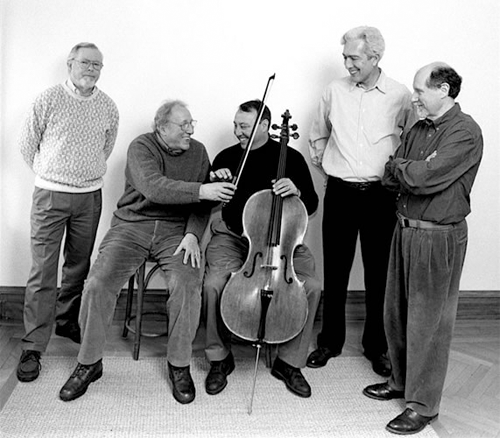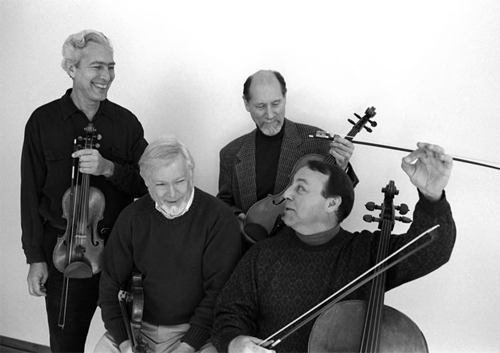
For the Very Last Time
October 6, 2009
On June 12, 2007, the Guarneri String Quartet sent out the following announcement:
Dear Friends,
We, the Guarneri String Quartet, have decided to retire at the end of the 2008-9 season, our forty-fifth year before the public. This has not only been a long journey, but a deeply satisfying one as well. What could be better than performing the inspired string quartet repertoire, traveling the world, and meeting wonderful people along the way!
We thank you, our loyal supporters, for your kindness, consideration, and unflagging efforts to keep chamber music alive and well. You have made our great adventure all the more rewarding.
With best wishes and warmest regards,
The Guarneri String Quartet
Arnold Steinhardt
Peter Wiley
John Dalley
Michael Tree
We reached the decision to retire with surprisingly little discussion. After an uncommonly long and richly rewarding career, the time seemed right. The string quartet literature demands both the virtuoso technique of a soloist and the precision of an expert watchmaker. Those skills get no easier with the years. In response to the announcement, many people thanked us for our performances over the years with a quality of emotion and gratefulness in their voices that made me feel as if we, along with doctors and priests, were in a service profession. Some listeners even recalled specific concerts and individual works from ten, twenty, and even forty years ago—a late Beethoven Quartet in Detroit, Michigan, a Smetana Quartet in Binghamton, New York, a Bartok Quartet in Salt Lake City, Utah that had particularly moved them. But often on the heels of their heartfelt thanks came questions. “Why did you decide to quit?” “What will you do afterwards?” “What will it feel like not to be playing string quartets after having done so for forty-five years?” This last question was the one I found hardest to answer. Frankly, I have little idea how it will feel. I suspect that even quitting a distasteful job after many years would cause severe withdrawal symptoms out of sheer habit. But we four, or should I say five members of the quartet—violinists Arnold and John, violist Michael, cellist Peter and his predecessor David Soyer—have loved being in the Guarneri Quartet. Imagine playing the exalted string quartet repertoire with musicians who have chosen each other out of mutual respect and admiration. Imagine actually being in control of your own professional destiny in so far as deciding repertoire, concerts, travel, and fees. How would we feel with this glorious calling gone from our lives? I did not know nor did I want to dwell too much on the quartet-less future that awaited us. Better to just keep on playing as well as possible and relish those last golden notes of four-part harmony to their fullest. Some would say I was in denial.

Guarneri Quartet cellist David Soyer passes the bow to Peter Wiley. Photo by Dorothea von Haeften.
On May 22, 2008, almost one year after our announced retirement, we performed one of the last concerts of our 44th season in Kempen, Germany. The concert consisted of two Beethoven string quartets: Opus 74, the “Harp,” followed by Opus 130 with the Great Fugue. We have played these works innumerable times but this performance represented something special that I did not yet realize as we walked out onto the stage of Kempen’s Kulturforum. Only during Opus 130’s Cavatina movement did it suddenly occur to me during the heat of performance that we would never play this towering work again—not its high jinx Scherzo, not its endearing German dance, not the Cavatina that supposedly moved Beethoven himself to tears, and not the Great Fugue, more a wildly turbulent and awe inspiring act of raw nature than a work of mere music. The remaining two concerts of the season contained different works and next season, the Guarneri’s last, would have a completely new set of programs. As we left the stage, I asked Michael, John, and Peter whether they realized what had just transpired. “We’ve just performed Opus 130 for the very last time,” Peter, our cellist, called out over the din of ongoing applause. “It hit me while we were playing. You too?” he asked. I nodded. As the quartet went back on stage for another bow, I realized that we had just performed the “Harp” for the very last time as well, and that in Vienna the next evening there would be last performances of Bartok’s Second String Quartet and Smetana’s From My Life. Even our last concert of the season in Amelia Island, Florida contained treasured works that we would never play again. Facing the audience, my eyes filled with tears.
Amelia Island has been the site of each season’s last concert for several years now, and in an extended final season it will be the place where we play our last ever next October 27, 2009. People ask why the Guarneri Quartet hasn’t planned an extravagant final farewell concert in a great cosmopolitan center such as New York City. The city’s Metropolitan Museum of Art comes to mind where we have performed over 250 times. Still, the idea of ending our career at a small festival appeals to me. The Quartet played its very first concert in August, 1964 on Nantucket Island and almost 4,000 concerts later, the last will be on another island. With hindsight, we might have aptly named ourselves the Island Bound String Quartet.
Backstage before the very last concert of each season, the quartet plans its next rehearsal after the usual summer break. At Amelia Island’s First Presbyterian Church last June, we agreed to meet again at 9:30 AM on September 23rd at John’s house. Standing among pews and about to walk out onto the improvised stage, Michael, our program chairman, reminded us to bring repertoire for the season’s first concerts—Haydn “Rider”, Bartok 3rd, Kodaly 2nd, Ravel, and Beethoven Opus 127 and 132. I cannot recall whether we said goodbye to one another after the concert. Surrounded by well-wishers, family, and personal friends, we often drift off in our separate directions without fanfare. Some might consider this unfeeling given the amount of intimacy we share on the concert stage. If the subject comes up at all, we joke among ourselves that not saying goodbye in June merely saves saying hello in September. After all, just as the earth circles the sun and the moon the earth in predictable fashion, we have been able to meet without fail every Fall for 45 years.
This year will be different, however. Before the very last concert, there will be no talk about the next rehearsal, new repertoire, travel itineraries, or business matters. When the next season reappears, the sun and moon will make their usual rounds without knowing (or caring) that the Guarneri String Quartet has retired, but John, Michael, Peter, and I will know and very much care. Gone will be the lengthy discussions about shaping a phrase, the heated arguments over the length of a single note, the laughter after we have taken ourselves much too seriously, the jokes, the good-natured teasing, and most of all, gone will be our long-standing relationship to the string quartets of Mozart, Beethoven, Schubert, and on and on—music that is the nectar of the Gods.
“I’m joining a heavy metal band,” I said, going for a cheap laugh when asked what we planned to do after the quartet retires. The probable truth is that we will all continue playing and teaching in one form or another. Having written two books, I also hope to go on writing. To be sure, our four paths will continue to cross. We have many friends in common, we teach at some of the same schools, and undoubtedly we will make music together in various combinations. There is also nothing to prevent us from playing string quartets with other musicians, but how can it possibly be the same. The string quartet demands many things: instrumental fluency, expert ensemble, pristine intonation, but all in the service of a very intimate artistry in four-part harmony. We have chosen one another initially out of admiration but inevitably from a certain distance. When a string quartet finally sits down to work together, the playing quickly becomes up close and very personal. We must root around in the recesses of each other’s psyches in order to find out what is relevant for the music’s sake. How do these three people sitting across from me think and feel? I have to know that Michael takes time in a particular phrase, that Peter doesn’t when he repeats it, and that John only decides how to play it at the spur of the moment. And after collecting thousands of such bits of information large and small over the years, I can state soberly and without too much boasting that I know Michael, John, and Peter’s playing very well.

Photo by Dorothea von Haeften.
Which leads me again to that final concert on Amelia Island. After the last note is played and the last bow taken, the last well-wisher’s hand shaken and the last program signed, the Guarneri String Quartet will be alone backstage for one brief moment before uncoupling ourselves and going off in separate directions forever. What can I possibly say to John, Michael, and Peter? “I’ve loved working with you.” “Best wishes for your future life.” “Let’s get together sometime.” These words won’t do at all, but what? We know full well how we feel about one another and what this quartet journey has meant. Perhaps words of any kind are unnecessary. Perhaps the Guarneri String Quartet should simply scatter to the winds as we often do after the season’s last concert without saying goodbye at all.
But if there are no real goodbyes or if my words fall hopelessly short of expressing what I feel in that last moment we share together, let me at least say this to you now, John, Michael, and Peter (and also David):
Thank you.
Subscribe
Sign up to receive new stories straight to your inbox!





































































































































































Comments
Come Oct 27th, I’ll be thinking of you guys. It was about 40 years ago when I was a student at the University of Wisconsin and first heard you perform. Thank you for a near-lifetime of wonderful sounds and memories.
My best wishes to all five of you! Thank you for the four and a half decades for which your music has sustained and uplifted us. I hope you’ll have many more years to pass on your experience and wisdom to succeeding generations of musicians.
But I hope this isn’t the very last time for Fiddler’s Beat.
No words, Arnold, just big kisses for each guy. Nothing else would do!
Congratulations on such a historic relationship and thanks for all of the wonderful recorded music for us. The Dvorak and Bluefields on your website are incredibly beautiful.
Your neighbor,
Sheri
Dear Dr. Steinhardt,
Congratulations, and thank you.
Thank you very much.
Emily
Mr. Steinhardt:
I thank you and the other members of the quartet on an extraordinary career. I discovered the Guarneri Quartet about four years ago and have seen you live a few times in Pasadena. I have
also read two of your books and enjoyed them immensely. I have another reason for writing, however. My father, who passed away in 1971, was a chamber music lover. At the time, I was
5 years old and we lived in New York. Though I don’t remember my father, I imagine he was
familiar with the Guarneri Quartet and perhaps saw you perform. So each time I heard the quartet
I imagined I was hearing the same music my father heard all those years ago. In this way, the
Guarneri Quartet provided me with a connection to my father I never would have had. For this I will
always be grateful. I wish you all the best in retirement.
Leave a Comment
*/